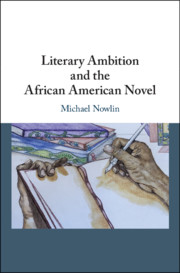Book contents
- Literary Ambition and the African American Novel
- Literary Ambition and the African American Novel
- Copyright page
- Dedication
- Contents
- Acknowledgments
- Abbreviations
- Introduction
- Chapter 1 “The First Negro Novelist”: Charles Chesnutt’s Point of View and the Emergence of African American Literature
- Chapter 2 James Weldon Johnson’s Dream of Literary Greatness and His Groundwork for an African American Literary Renaissance
- Chapter 3 The Strange Literary Career of Jean Toomer
- Chapter 4 Wallace Thurman’s Judgment and the Rush toward Modernism
- Chapter 5 Zora Neale Hurston and the Great Unwritten
- Chapter 6 Richard Wright’s Compromises: Radicalism and Celebrity as Paths to Literary Freedom
- Chapter 7 “Literary to a Fault”: The Singular Triumph of Ralph Ellison
- Conclusion
- Notes
- References
- Index
Chapter 2 - James Weldon Johnson’s Dream of Literary Greatness and His Groundwork for an African American Literary Renaissance
Published online by Cambridge University Press: 17 October 2019
- Literary Ambition and the African American Novel
- Literary Ambition and the African American Novel
- Copyright page
- Dedication
- Contents
- Acknowledgments
- Abbreviations
- Introduction
- Chapter 1 “The First Negro Novelist”: Charles Chesnutt’s Point of View and the Emergence of African American Literature
- Chapter 2 James Weldon Johnson’s Dream of Literary Greatness and His Groundwork for an African American Literary Renaissance
- Chapter 3 The Strange Literary Career of Jean Toomer
- Chapter 4 Wallace Thurman’s Judgment and the Rush toward Modernism
- Chapter 5 Zora Neale Hurston and the Great Unwritten
- Chapter 6 Richard Wright’s Compromises: Radicalism and Celebrity as Paths to Literary Freedom
- Chapter 7 “Literary to a Fault”: The Singular Triumph of Ralph Ellison
- Conclusion
- Notes
- References
- Index
Summary
This chapter focuses on three stages in the career of James Weldon Johnson. It deals first with Johnson’s expressed ambition to be the first great African American poet at the moment when he had just written “Fifty Years” and was set to publish The Autobiography of an Ex-Colored Man. When Johnson’s hopes for a national literary reputation were disappointed, he then turned to the promotional, critical, theoretical, and editorial work that laid important groundwork for the Harlem Renaissance, which would help establish conditions for the quantitative production of African American writing from which great individual work, and more modern, experimental work, would emerge. The chapter argues for Johnson’s understanding of the extent to which a people’s literary output is inescapably measured in an international context, an understanding he grasped as a result of his familiarity with Latin American modernismo, even as he seemed unfamiliar with the expatriate American modernist agenda of Ezra Pound. During the 1920s and at the high point of the Harlem Renaissance he helped launch and promote, Johnson was able to capitalize on the arrival of a substantial body of African American writing to reissue his nearly forgotten novel as a “classic of Negro literature” and publish his major poetic effort, God’s Trombones.
- Type
- Chapter
- Information
- Literary Ambition and the African American Novel , pp. 49 - 71Publisher: Cambridge University PressPrint publication year: 2019

